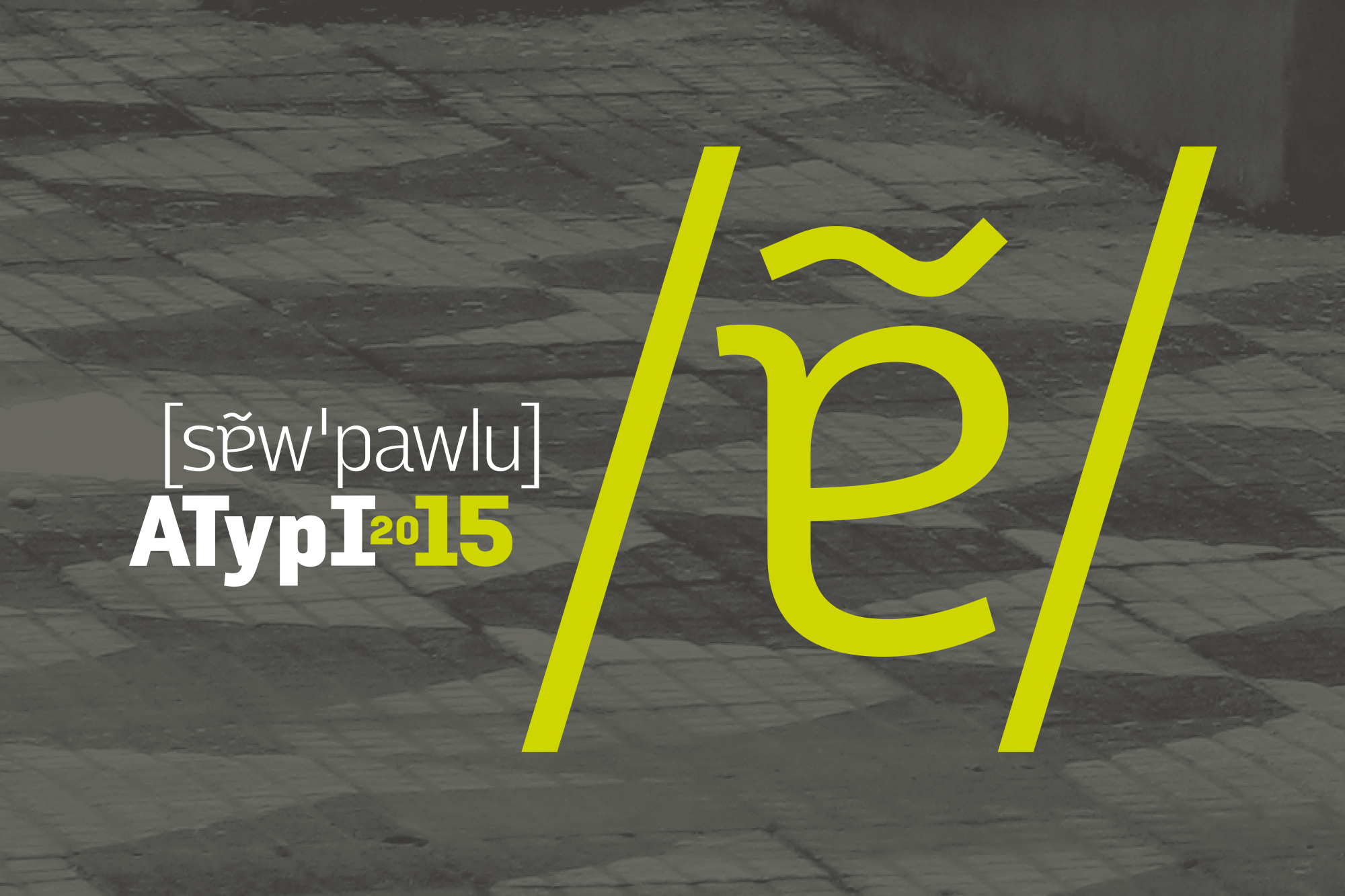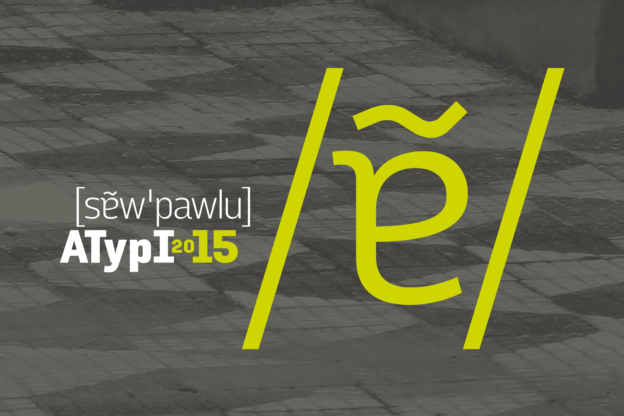The 2015 edition of the annual conference of the Association Typographique Internationale (ATypI) took place in São Paulo, Brazil. Its visual identity was based on the phonetic transcription of the local pronunciation of the name of the host city: /ˌsɐ̃w ˈpawlu/. From this transcription, one symbol was isolated and used as a sort of logo: /ɐ̃/ – both an interesting glyph design-wise and the symbol of a characteristic sound of Portuguese (a nasalised centralised vowel). I think it was a great choice for a type conference in Brazil. What’s more, I liked the typefaces they used in their visual identity, among others Voces (by Ana Paula Megda & Pablo Ugerman) and Brasilica (by Rafael Dietzsch). An extension of the latter, including phonetic symbols, has been announced for 2016 (and I’m quite curious about that).

Despite the cleverness of the concept, not all of its implementations were equally successful. I saw one on YouTube that I was a bit disappointed about: The video recordings of all conference talks – kudos for making them available – had thumbnails showing the names of the speakers and phonetic transcriptions of their names. As I already pointed out on Twitter, many of the transcriptions were inaccurate. In some cases, it was not even clear to me if the transcription was supposed to represent an Anglicised pronunciation or the way speakers would pronounce their names in their native languages. Admittedly, making phonetic transcriptions is not that easy – whether you use the International Phonetic Alphabet (IPA), as they wisely did, or any other system. I don’t know who created the transcriptions in the thumbnails and I don’t know why they ended up being inaccurate: Maybe the transcriber was lacking information or it was a rush job or correct transcriptions were garbled in the design process.
What I want to do here is to provide correct transcriptions of the native pronunciation of the speakers’ names (or at least, I will try to avoid the most egregious mistakes that were made in the original transcriptions). As I said before, making phonetic transcriptions can be difficult: Language varies a lot – across place, time, situation etc. Not everyone agrees on how to describe all this variation; not everyone agrees on how to transcribe it. Trying to pin down the symbol that exactly represents one sound has led to heated debates among linguists more than just once. For that reason, I’d like to invite you to let me know if you disagree with the way I transcribed any of the names.
For all those who do not read IPA transcriptions fluently, there are some audio recordings: Whenever you see a ? symbol next to a name, you can click on it to listen to the speaker’s own pronunciation of their name. Most speakers say something along the lines of ‘Hi, my name is […], I come from […] and my mother tongue is […]’ – all that in (one of) their native language(s). I hope to add more recordings in the future, but this may take some time. Similarly, some transcriptions require a bit of research, so the list will not be complete from the outset, but be filled over time. Anyway, here is the list:
- Erich Alb 🇨🇭
[ˌeː.rɪç ˈalb̥] (Swiss Standard German) - Isabella Aragão 🇧🇷 🔊
[i.zaˌbɛ.la a.ɾaˈɡɐ̃w] (Brazilian Portuguese) - Clare Bell 🇮🇪
[ˌklɛɹ ˈbɛl] (Irish English) - John D. Berry 🇺🇸
[ˌd͡ʒɑːn ˌdiː ˈbɛ.ɹi] (American English) - Ann Bessemans 🇧🇪
[ˌɑn ˈbɛ.sə.mɑns] (Belgian Dutch) - Tomáš Brousil 🇨🇿
[ˌto.maːʃ ˈbɾou̯.sɪl] (Czech) - Miguel Catopodis 🇦🇷
[miˌɣel ka.toˈpo.ðis] (Spanish) - Stephen Coles 🇺🇸 🔊
[ˌstiː.vn̩ ˈkoːlz] (American English)
Note: There is some dialectal variation with respect to the pronunciation of the phonemes in English words like ‘face’ and ‘goat’. In the British Received Pronunciation, these sounds are diphthongs: [eɪ̯] and [oʊ̯]. In many American varieties, by contrast, they are pronounced as monophthongs: [eː] and [oː]. In the recording that Stephen Coles was kind of enough to provide, we can hear that there is hardly any diphthongic movement in his own ‘goat’ vowel. That is one more reason to transcribe this vowel as a monophthong in his name. - Catherine Dixon 🇬🇧
[ˌkæ.θɹɪn ˈdɪk.sn̩] (British English) - Sandro Fetter 🇧🇷
[ˌsɐ̃.dɾu ˈfɛ.tɛɾ] (Brazilian Portuguese) - Lucas de Groot 🇳🇱
[ˌɫy.kɑs dəˈχɾoʊ̯t] (Netherlands Dutch) - Karel Haloun 🇨🇿
[ˌka.ɾɛl ˈɦa.lou̯n] (Czech) - Cassie Hester 🇺🇸
[ˌkæ.si ˈhɛs.tɚ] (American English) - Simon Johnston 🇬🇧
[ˌsaɪ̯.mən ˈd͡ʒɒn.stn̩] (British English) - Kevin Larson 🇺🇸
[ˌkɛ.vɪn ˈlɑːɹ.sn̩] (American English) - Raph Levien 🇺🇸
[ˌɹeɪ̯f ləˈviːn] (American English) - Bruno Maag 🇨🇭
[ˌbruːno ˈmaːɡ̊] (Swiss Standard German) - Fernanda Martins 🇧🇷 🔊
[feɦˌnɐ̃nda maɾˈt͡ʃĩs] (Brazilian Portuguese)
Note: The distribution of the phonemes /ɾ/ and /ʁ/ in Brazilian Portuguese is subject to regional variation. In the South of Brazil, it is the same as in Portugal (detailed here). I have followed these rules in my transcriptions. Different (and simpler) rules apply in other parts of the country: Here, /ɾ/ is only used when it is preceded by either /n/, /l/, /z/, /ʒ/ or a vowel as well as followed by a vowel. ‘Martins’ would be pronounced [maɦˈt͡ʃĩs] in these varieties. In either region, the realisation of /ʁ/ differs markedly from what is heard in Portugal. - Henrique Nardi 🇧🇷
[ẽˌɦi.kɪ ˈnaɾ.d͡ʒɪ] (Brazilian Portuguese) - Rafael Neder 🇧🇷
[ha.faˌɛw ˈnɛ.dɛɾ] (Brazilian Portuguese) - Alessia Nicotra 🇮🇹
[aˌlɛs.ːi̯a niˈkɔː.tɾa] (Italian) - Yves Peters 🇧🇪 🔊
[ˌif ˈpeː.təɾs] (Belgian Dutch) - Claudio Rocha 🇧🇷
[ˌklaw.d͡ʒu ˈhɔ.ʃa] (Brazilian Portuguese) - Keitaro Sakamoto 🇯🇵
[keːꜜta.ɺoː sa.kaꜜmo.to] (Japanese) - Rob Saunders 🇺🇸
[ˌɹɑːb ˈsɔːn.dɚz] (American English) - Radek Sidun 🇨🇿
[ˌɾa.dɛk ˈsɪ.dun] (Czech) - Miguel Sousa 🇵🇹 🔊
[miˌɣɛɫ ˈso.zɐ] (European Portuguese) - Pablo Ugerman 🇦🇷
[ˌpa.βlo ˈu.ɣeɾ.man] (Spanish) - Irmi Wachendorff 🇩🇪
[ˌɪʁ.mi ˈʋa.xn̩.dɔʁf] (Standard German)
If you were a speaker at ATypI 2015 and would like to be featured in the list, just let me know. If you are already on the list and would like to contribute a recording, feel free to get in touch as well.
